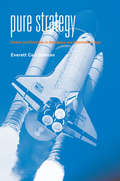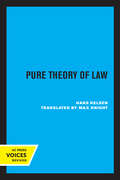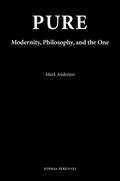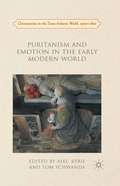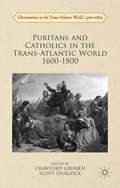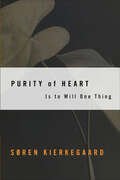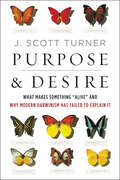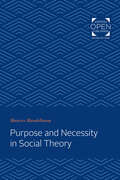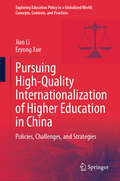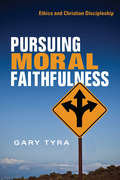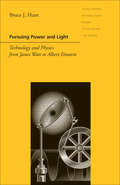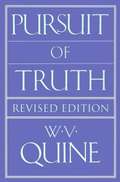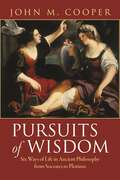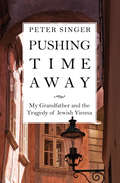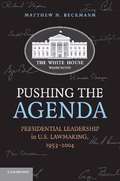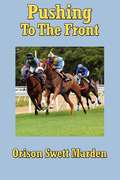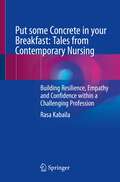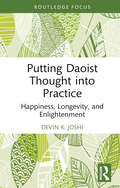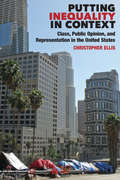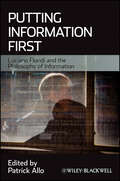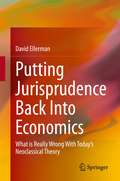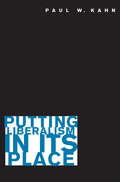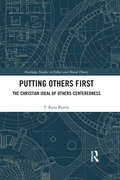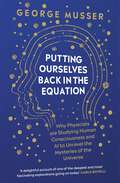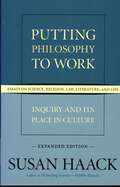- Table View
- List View
Pure Strategy: Power and Principle in the Space and Information Age (Strategy and History)
by Everett DolmanA stimulating new inquiry into the fundamental truth of strategy - its purpose, place, utility, and value. This new study is animated by a startling realization: the concept of strategic victory must be summarily discarded. This is not to say that victory has no place in strategy or strategic planning. The outcome of battles and campaigns are variables within the strategist's plan, but victory is a concept that has no meaning there. To the tactical and operational planner, wars are indeed won and lost, and the difference is plain. Success is measurable; failure is obvious. In contrast, the pure strategist understands that war is but one aspect of social and political competition, an ongoing interaction that has no finality. Strategy therefore connects the conduct of war with the intent of politics. It shapes and guides military means in anticipation of a panoply of possible coming events. In the process, strategy changes the context within which events will happen. In this new book we see clearly that the goal of strategy is not to culminate events, to establish finality in the discourse between states, but to continue them; to influence state discourse in such a way that it will go forward on favorable terms. For continue it will. This book will provoke debate and stimulate new thinking across the field and strategic studies.
Pure Theory of Law
by Hans KelsenThis title is part of UC Press's Voices Revived program, which commemorates University of California Press’s mission to seek out and cultivate the brightest minds and give them voice, reach, and impact. Drawing on a backlist dating to 1893, Voices Revived makes high-quality, peer-reviewed scholarship accessible once again using print-on-demand technology. This title was originally published in 1967.
Pure: Modernity, Philosophy, and the One
by Mark AndersonPure: Modernity, Philosophy, and the One is an experimental work of philosophy in which the author aspires to think his way back to a "premodern" worldview derived from the philosophical tradition of Platonism. To this end he attempts to identify and elucidate the fundamental intellectual assumptions of modernity and to subject these assumptions to a critical evaluation from the perspective of Platonic metaphysics. The author addresses a broad range of subjects - from ethics, politics, metaphysics, and science to the philosophies of Plato, Plotinus, Schopenhauer, and Nietzsche - without losing sight of the single aim of formulating a premodern perspective in opposition to modernity. The work culminates in a series of essays on the practice of purification, a form of intellectual and spiritual discipline acknowledged by ancient and medieval philosophers alike to be a necessary preliminary to metaphysical insight. Pure is informed throughout by rigorous scholarship, but it is not an "academic" work. The author avoids the plodding and professorial tone typical of contemporary philosophical research in favor of a meditative and aphoristic style. The book, in short, is learned without being pedantic. Readers interested in the history of philosophy and the intellectual roots of the crisis of modernity will find in Pure substantial matter for reflection.
Puritanism and Emotion in the Early Modern World (Christianities in the Trans-Atlantic World)
by Alec Ryrie Tom SchwandaPuritanism has a reputation for being emotionally dry, but seventeenth-century Puritans did not only have rich and complex emotional lives, they also found meaning in and drew spiritual strength from emotion. From theology to lived experience and from joy to affliction, this volume surveys the wealth and depth of the Puritans' passions.
Puritans and Catholics in the Trans-Atlantic World 1600-1800 (Christianities in the Trans-Atlantic World)
by Crawford Gribben R. Scott SpurlockFor many English puritans, the new world represented new opportunities for the reification of reformation, if not a site within which they might begin to experience the conditions of the millennium itself. For many Irish Catholics, by contrast, the new world became associated with the experience of defeat, forced transportation, indentured service, cultural and religious loss. And yet, as the chapters in this volume demonstrate, the Atlantic experience of puritans and Catholics could be much less bifurcated than some of the established scholarly narratives have suggested: puritans and Catholics could co-exist within the same trans-Atlantic families; Catholics could prosper, just as puritans could experience financial decline; and Catholics and puritans could adopt, and exchange, similar kinds of belief structures and practical arrangements, even to the extent of being mistaken for each other. This volume investigates the history of Puritans and Catholics in the Atlantic world, 1600-1800.
Purity of Heart: Is To Will One Thing
by Soren KierkegaardIn Kierkegaard’s view, faith is the most essential task of life. Faith is not a matter of dogmatic adherence, but rather of subjective passion. In Purity of Heart, Kierkegaard discusses multiple facets of human existence, particularly the responsibility of each person to single-mindedly seek out spiritual understanding and ethical integrity. While insisting that each reader must find their own path, Kierkegaard does offer clues to the nature of goodness. Søren Kierkegaard (1813-1855) was a Danish philosopher and theologian. Much of his work deals with religious problems such as faith in God, the institution of the Christian Church, Christian ethics and theology, and the emotions and feelings of individuals when faced with life choices. “About the greatness of the book there can be no question. It should be regarded as the equivalent of shock therapy.”—The Living Church
Purpose & Desire: What Makes Something "Alive" and Why Modern Darwinism Has Failed to Explain It
by J. Scott TurnerCan biology define life? “[An] ingenious mixture of science and philosophy. . . . highly thought-provoking.” —Kirkus Reviews (starred review)In this book a professor, biologist, and physiologist argues that modern Darwinism’s materialist and mechanistic biases have led to a scientific dead end, unable to define what life is—and only an openness to the qualities of purpose and desire will move the field forward.As Scott Turner contends: “To be scientists, we force ourselves into a Hobson’s choice on the matter: accept intentionality and purposefulness as real attributes of life, which disqualifies you as a scientist; or become a scientist and dismiss life’s distinctive quality from your thinking. I have come to believe that this choice actually stands in the way of our having a fully coherent theory of life.”Growing research shows that life’s most distinctive quality, shared by all living things, is purpose and desire: maintain homeostasis to sustain life. In Purpose and Desire, Turner draws on the work of Claude Bernard, a contemporary of Darwin revered among physiologists as the founder of experimental medicine, to build on Bernard’s “dangerous idea” of vitalism, which seeks to identify what makes “life” a unique phenomenon of nature. To further its quest to achieve a fuller understanding of life, Turner says, science must move beyond strictly accepted measures that consider only the mechanics of nature. A thoughtful appeal to widen our perspective of biology that is grounded in scientific evidence, Purpose and Desire helps us bridge the ideological evolutionary divide.“A must-read for everybody interested in the science of life and evolution . . . one of those rare science books which inquisitive laypeople will equally enjoy. Purpose and Desire will change the way you think of life.” —Washington Book Review“[A] beautifully written book, brimming with anecdotes and biological insights . . . will leave readers moved by Turner’s deep appreciation of life’s exquisiteness, its richness, and diversity . . . a provocative thesis, but one that is a wonderfully rich read, thought-provoking, and highly recommended.” —The Quarterly Review of Biology
Purpose and Necessity in Social Theory
by Maurice MandelbaumOriginally published in 1987. Philosopher Maurice Mandelbaum offers a broad-ranging essay on the roles of chance, choice, purpose, and necessity in human events. He traces the many changes these concepts have undergone, from the analyses of Hobbes and Spinoza, through the eighteenth, nineteenth, and early twentieth centuries. Mandelbaum examines two contrary tendencies in the history of social theories. Some thinkers, he shows, have explained the character of institutions in terms of their individual purposes, whereas others have stressed relationships of necessity among society's institutions. Mandelbaum discusses chance, choice, and necessity at length and reaches some provocative conclusions about the ways in which they are interwoven in human affairs.
Pursuing High-Quality Internationalization of Higher Education in China: Policies, Challenges, and Strategies (Exploring Education Policy in a Globalized World: Concepts, Contexts, and Practices)
by Jian Li Eryong XueThis book comprehensively explores the internationalization of higher education in China from the aspects of both challenges and strategies. It analyzes the current educational policies of internationalization in China's higher education, such as the educational policies in running international schools, the educational policies of intercollegiate international exchange, the educational policies of Chinese-Foreign cooperatively run schools, and the educational policies of foreign teachers' professional development. Additionally, this book proposes specific suggestions to address the various problems of internationalization in China’s higher education.
Pursuing Moral Faithfulness: Ethics and Christian Discipleship
by Gary TyraChristianity is in a state of moral crisis. Even though people make moral decisions every day, many Christians lack both the ability to evaluate these decisions and a community of discipleship to help inspire a morally faithful life. Compared to the people around them, there is often no discernible difference in how Christians go about making moral choices. As a biblical and practical theologian with three decades of pastoral experience, who has also spent years teaching ethics to undergraduates, Gary Tyra approaches the topic with the practical goal of facilitating moral formation and encouraging an "everyday" moral faithfulness. Tyra argues that Christians can have confidence in their Christ-centered, Spirit-enabled ability to discern and do the will of God in any moral situation. Moral faithfulness follows from a life of Christian discipleship. In an age of moral apathy and theological confusion, Pursuing Moral Faithfulness is a breath of fresh air and a sign of hope for the future.
Pursuing Power and Light: Technology and Physics from James Watt to Albert Einstein (Johns Hopkins Introductory Studies in the History of Science)
by Bruce J. HuntIn the nineteenth century, science and technology developed a close and continuing relationship. The most important advancements in physics—the science of energy and the theory of the electromagnetic field—were deeply rooted in the new technologies of the steam engine, the telegraph, and electric power and light. Bruce J. Hunt here explores how the leading technologies of the industrial age helped reshape modern physics.This period marked a watershed in how human beings exerted power over the world around them. Sweeping changes in manufacturing, transportation, and communications transformed the economy, society, and daily life in ways never before imagined. At the same time, physical scientists made great strides in the study of energy, atoms, and electromagnetism. Hunt shows how technology informed science and vice versa, examining the interaction between steam technology and the formulation of the laws of thermodynamics, for example, and that between telegraphy and the rise of electrical science.Hunt’s groundbreaking introduction to the history of physics points to the shift to atomic and quantum physics. It closes with a brief look at Albert Einstein’s work at the Swiss patent office and the part it played in his formulation of relativity theory. Hunt translates his often-demanding material into engaging and accessible language suitable for undergraduate students of the history of science and technology.
Pursuit Of Truth
by W. V. QuineIn Pursuit of Truth W. V. Quine gives us his latest word on issues to which he has devoted many years. As he says in the preface: "In these pages I have undertaken to update, sum up, and clarify my variously intersecting views on cognitive meaning, objective reference, and the grounds of knowledge?'The pursuit of truth is a quest that links observation, theory, and the world. Various faulty efforts to forge such links have led to much intellectual confusion. Quine's efforts to get beyond the confusion begin by rejecting the very idea of binding together word and thing, rejecting the focus on the isolated word. For him, observation sentences and theoretical sentences are the alpha and omega ofthe scientific enterprise. Notions like "idea" and "meaning" are vague, but a sentence-now there's something you can sink your teeth into. <p><p> Starting thus with sentences, Quine sketches an epistemological setting for the pursuit of truth. He proceeds to show how reification and reference contribute to the elaborate structure that can indeed relate science to its sensory evidence.In this book Quine both summarizes and moves ahead. Rich, lively chapters dissect his major concerns-evidence, reference, meaning, intension, and truth. "Some points;' he writes, "have become clearer in my mind in the eight years since Theories and Things. Some that were already clear in my mind have become clearer on paper. And there are some that have meanwhile undergone substantive change for the better." This is a key book for understanding the effort that a major philosopher has made a large part of his life's work: to naturalize epistemology in the twentieth century. The book is concise and elegantly written, as one would expect, and does not assume the reader's previous acquaintance with Quine's writings. Throughout, it is marked by Quine's wit and economy of style.
Pursuits of Wisdom: Six Ways of Life in Ancient Philosophy from Socrates to Plotinus
by John M. CooperThis is a major reinterpretation of ancient philosophy that recovers the long Greek and Roman tradition of philosophy as a complete way of life--and not simply an intellectual discipline. Distinguished philosopher John Cooper traces how, for many ancient thinkers, philosophy was not just to be studied or even used to solve particular practical problems. Rather, philosophy--not just ethics but even logic and physical theory--was literally to be lived. Yet there was great disagreement about how to live philosophically: philosophy was not one but many, mutually opposed, ways of life. Examining this tradition from its establishment by Socrates in the fifth century BCE through Plotinus in the third century CE and the eclipse of pagan philosophy by Christianity, Pursuits of Wisdom examines six central philosophies of living--Socratic, Aristotelian, Stoic, Epicurean, Skeptic, and the Platonist life of late antiquity. The book describes the shared assumptions that allowed these thinkers to conceive of their philosophies as ways of life, as well as the distinctive ideas that led them to widely different conclusions about the best human life. Clearing up many common misperceptions and simplifications, Cooper explains in detail the Socratic devotion to philosophical discussion about human nature, human life, and human good; the Aristotelian focus on the true place of humans within the total system of the natural world; the Stoic commitment to dutifully accepting Zeus's plans; the Epicurean pursuit of pleasure through tranquil activities that exercise perception, thought, and feeling; the Skeptical eschewal of all critical reasoning in forming their beliefs; and, finally, the late Platonist emphasis on spiritual concerns and the eternal realm of Being. Pursuits of Wisdom is essential reading for anyone interested in understanding what the great philosophers of antiquity thought was the true purpose of philosophy--and of life.
Pushing Time Away: My Grandfather and the Tragedy of Jewish Vienna
by Peter Singer"A beautifully written and deeply moving personal document by one of our preeminent contemporary philosophers." --Joyce Carol Oates Peter Singer's Pushing Time Away is a rich and loving portrait of the author's grandfather, David Oppenheim, from the turn of the twentieth century to the end of his life in a concentration camp during the Second World War. Oppenheim, a Jewish teacher of Greek and Latin living in Vienna, was a contemporary and friend of both Sigmund Freud and Alfred Adler. With his wife, Amalie, one of the first women to graduate in math and physics from the University of Vienna, he witnessed the waning days of the Hapsburg Empire, the nascence of psychoanalysis, the grueling years of the First World War, and the rise of anti-Semitism and Nazism. Told partly through Oppenheim's personal papers, including letters to and from his wife and children, Pushing Time Away blends history, anecdote, and personal investigation to pull the story of one extraordinary life out of the millions lost to the Holocaust. This ebook features an illustrated biography of Peter Singer, including rare photos from the author's personal collection.
Pushing the Agenda
by Matthew N. BeckmannToday's presidents enter office having campaigned on an ambitious policy agenda, eager to see it enacted, and willing to push so that it is. The central question of presidents' legislative leadership, therefore, is not a question of resolve, it is a question of strategy: by what means can presidents build winning coalitions for their agenda? Pushing the Agenda uncovers the answer. It reveals the predictable nature of presidents' policy making opportunities and the systematic strategies White House officials employ to exploit those opportunities. Drawing on an eclectic array of original evidence - spanning presidents from Dwight Eisenhower to George W. Bush and issues ranging from education to energy, and healthcare to taxes - Matthew N. Beckmann finds modern presidents' influence in Congress is real, often substantial, and - to date - largely underestimated.
Pushing to the Front
by Orison Swett MardenLike many proponents of the New Thought philosophy, Marden believed that our thoughts influence our lives and our life circumstances. He said, "We make the world we live in and shape our own environment." ]Yet although he is best known for his books on financial success, he always emphasized that this would come as a result of cultivating one's personal development: "The golden opportunity you are seeking is in yourself. It is not in your environment; it is not in luck or chance, or the help of others; it is in yourself alone."
Put some Concrete in your Breakfast: Building Resilience, Empathy and Confidence within a Challenging Profession
by Rasa KabailaThis book gives a sincere yet honest representation of modern nursing in all its forms rather than purely focusing only on the ‘good’ ‘the funny’ ‘the sad’ or the ‘ugly’. This book provides a collection of stories that concentrate on nursing, that validates, educates and encourages those undertaking a career in nursing. In addition, this book also celebrates the amazing rewards that the unique career of nursing has to offer, for those who can find a way to persevere through the challenges. There is a high rate of burnout among nurses in their early days of practice, because of the high demands placed on them by the healthcare system; hospital administrations; the expectations of management, patients, families and carers; and the sheer size of the patient loads with complex needs these days. The global pandemic erupting has now pushed a health care service that was already under pressure to now be in complete crisis. The world now knows that we need more nurses employed to be able to move forward from this calamity. This book closes that gap in that it encourages the readers to continue to pursue a career in nursing (despite the challenges that the profession holds) while also positively promoting the incredible work that nurses do. The chapters within this book, explore a cornucopia of different aspects of nursing including: caring for dying patients, dealing with bodily fluids and how patients are not very good at working out how sick they really are. The book also covers how to manage the care of patients with complex mental illnesses and those contemplating suicide. This book is targeted at nurses who may feel a little overwhelmed with the world that is nursing but who wish to thrive and further their career. Discussion questions at the end of the book further add to the reflection and learning process of the reader.
Putting Daoist Thought into Practice: Happiness, Longevity, and Enlightenment
by Devin K. JoshiThis book shows how Chinese wisdom originating many centuries ago is still highly relevant to our lives today as the Daoist classics provide insightful prescriptions on how to live a life full of happiness, contentment, and healthy longevity. They also provide guidance regarding personal ethics, sustainable economics, and achieving enlightenment.The book contains reflections on how to achieve happiness drawing from the Liezi, a Daoist classic, and it examines Daoist ideas about nourishing life to achieve longevity and the marked similarity between these principles and people living in “blue zones” today with the highest concentration of centenarians. It explores Daoist views on consciousness and enlightenment in the Laozi and Zhuangzi and their close resemblance to some of the most influential “new age” teachings on the subject. It highlights the ethical character of a Daoist sage by drawing on the Daoist classic of the Wenzi and enumerates lessons for transitioning toward a sustainable economy from the Daodejing.Covering multiple dimensions of classical Daoist thought and their contemporary applications to human development and well-being, this text will usefully inform scholars, students, and researchers of Asian studies, religion, and philosophy, and individuals seeking self-improvement and personal wellness.
Putting Inequality in Context: Class, Public Opinion, and Representation in the United States
by Christopher EllisRising income inequality is highlighted as one of the largest challenges facing the United States, affecting civic participation and political representation. Although the wealthy often can and do exert more political influence, this is not always the case. To fix political inequality, it is important to understand exactly how class divisions manifest themselves in political outcomes, and what factors serve to enhance, or depress, inequalities in political voice. Christopher Ellis argues citizens’—and legislators’—views of class politics are driven by lived experience in particular communities. While some experience is formally political, on an informal basis citizens learn a great deal about their position in the broader socioeconomic spectrum and the social norms governing how class intersects with day-to-day life. These factors are important for policymakers, since most legislators do not represent “the public” at large, but specific constituencies. Focusing on U.S. congressional districts as the contextual unit of interest, Ellis argues individuals’ political behavior cannot be separated from their environment, and shows how income’s role in political processes is affected by the contexts in which citizens and legislators interact. Political inequality exists in the aggregate, but it does not exist everywhere. It is, rather, a function of specific arrangements that depress the political influence of the poor. Identifying and understanding these factors is a crucial step in thinking about what reforms might be especially helpful in enhancing equality of political voice.
Putting Information First: Luciano Floridi and the Philosophy of Information (Metaphilosophy Ser. #16)
by Patrick AlloPutting Information First focuses on Luciano Floridi’s contributions to the philosophy of information. Respected scholars stimulate the debate on the most distinctive and controversial views he defended, and present the philosophy of information as a specific way of doing philosophy. Contains eight essays by leading scholars, a reply by Luciano Floridi, and an epilogue by Terrell W. Bynum Explains the importance of philosophy of information as a specific way of doing philosophy Focuses directly on the work of Luciano Floridi in the area of philosophy of information, but also connects to contemporary concerns in philosophy more generally Illustrates several debates that arise from core themes in the philosophy of information
Putting Jurisprudence Back Into Economics: What is Really Wrong With Today's Neoclassical Theory
by David EllermanThis book presents an integrated jurisprudential critique of neoclassical microeconomic theory. It explains what is ‘really wrong’ with the theory both descriptively, as well as normatively. The criticism presented is based on questions of jurisprudence, and on neoclassical theory’s sins of omission and commission concerning the underlying system of property and contract. On the positive side - while the presentation is almost entirely non-mathematical - the book contains the first mathematical treatment of the fundamental theorem about property and contract in jurisprudence that underlies a market economy.The book follows the tradition of John Stuart Mill as the last major political economist who considered the study of property rights as an integral part of economic theory. The conceptual criticisms presented in this book focus on the descriptive and normative misconceptions about property and contracts that are deeply embedded ideology in neoclassical economics, not to mention in the broader society. The book recognizes that the idealized microeconomic theory is not descriptive of reality and focuses its criticism on conceptual mistakes in the theory, which are even clearer due to the idealized nature of the theory. Therefore, the book is a must-read for scholars, researchers, and students interested in a better understanding of jurisprudence in economics, neoclassical microeconomic theory, and political economy in general.
Putting Liberalism in Its Place
by Paul W. KahnIn this wide-ranging interdisciplinary work, Paul W. Kahn argues that political order is founded not on contract but on sacrifice. Because liberalism is blind to sacrifice, it is unable to explain how the modern state has brought us to both the rule of law and the edge of nuclear annihilation. We can understand this modern condition only by recognizing that any political community, even a liberal one, is bound together by faith, love, and identity. Putting Liberalism in Its Place draws on philosophy, cultural theory, American constitutional law, religious and literary studies, and political psychology to advance political theory. It makes original contributions in all these fields. Not since Charles Taylor's The Sources of the Self has there been such an ambitious and sweeping examination of the deep structure of the modern conception of the self. Kahn shows that only when we move beyond liberalism's categories of reason and interest to a Judeo-Christian concept of love can we comprehend the modern self. Love is the foundation of a world of objective meaning, one form of which is the political community. Arguing from these insights, Kahn offers a new reading of the liberalism/communitarian debate, a genealogy of American liberalism, an exploration of the romantic and the pornographic, a new theory of the will, and a refoundation of political theory on the possibility of sacrifice. Approaching politics from the perspective of sacrifice allows us to understand the character of twentieth-century politics, which combined progress in the rule of law with massive slaughter for the state. Equally important, this work speaks to the most important political conflicts in the world today. It explains why American response to September 11 has taken the form of war, and why, for the most part, Europeans have been reluctant to follow the Americans in their pursuit of a violent, sacrificial politics. Kahn shows us that the United States has maintained a vibrant politics of modernity, while Europe is moving into a postmodern form of the political that has turned away from the idea of sacrifice. Together with its companion volume, Out of Eden, Putting Liberalism in Its Place finally answers Clifford Geertz's call for a political theology of modernity.
Putting Others First: The Christian Ideal of Others-Centeredness (Routledge Studies in Ethics and Moral Theory)
by T. Ryan ByerlyWhen deciding what to do, is it best to treat one’s own interests as more important than the interests of others, others’ interests as more important than one’s own, or one’s own and others’ interests as equally important? This book develops an account of others-centeredness, a way of putting others first in the process of deciding what to do. Over the course of six chapters, Putting Others First investigates other-centeredness by drawing upon a wide range of academic disciplines including biblical studies, feminist scholarship, philosophy, psychology, and theology. The author begins by explaining the nature of others-centeredness as a character trait in detail and connecting it with other contemporary projects in virtue theory. He argues that foundational texts of the New Testament can be plausibly read as advocating for others-centeredness. He then develops a provisional case for the value of others-centeredness from the perspective of each of the three major approaches to normative ethics: consequentialism, deontology, and virtue ethics. Next, the author confronts challenging questions about the value of others-centeredness, including whether others-centeredness requires an impossibly strong sort of altruism, whether it leads its possessors into self-destructive relationships, and whether it leads to offering help that hurts others. Finally, he examines the place of others-centeredness within a person’s moral psychology by considering the relationship between it and other virtues and vices, and reviews relevant scientific findings that illuminate the value and causal role of others-centeredness.
Putting Ourselves Back in the Equation: Why Physicists Are Studying Human Consciousness and AI to Unravel the Mysteries of the Universe
by George MusserDistant galaxies, dark matter, black holes – elusive, incomprehensible and inhospitable – these are the building blocks of modern physics. But where do we fit in this picture? For centuries, we have separated mind from matter. While physicists have pursued a theory of &‘everything&’ with single-minded purpose, the matter of the mind, of human consciousness, has been conveniently sidestepped and ignored – consigned to priests, philosophers and poets. With the ambition of Stephen Hawking, Carlo Rovelli and Brian Cox, Putting Ourselves Back in the Equation sets out a bold new vision for theoretical physics, unrestricted by sleek equations and neat formulations. Combining cutting-edge neuroscience with the latest in quantum mechanics, acclaimed writer Musser offers a new interpretation of human consciousness. From bizarre cognitive phenomena, like lucid dreaming and self-taught synaesthesia, to the latest technological developments in AI, Musser asks: what can physics teach us about what it means to be human?
Putting Philosophy to Work: Inquiry and Its Place in Culture -- Essays on Science, Religion, Law, Literature, and Life
by Susan HaackThis engaging and wide-ranging collection of essays is informed and unified by the conviction that philosophy can, and should, engage with real-world issues. Susan Haack's keen analytical skills and well-chosen illustrations illuminate a diverse range of cultural questions; and her direct style and wry sense of humor make complex ideas and subtle distinctions accessible to serious readers whatever their discipline or particular interests. Putting Philosophy to Work will appeal not only to philosophers but also to thoughtful scientists, economists, legal thinkers, historians, literary scholars, and humanists. This new, expanded second edition includes several previously unpublished essays: a devastating critique of Karl Popper's highly (and dangerously) influential philosophy of science; a searching and thought-provoking analysis of scientism; and a groundbreaking paper on "academic ethics in a preposterous environment" that every professor, and would-be professor, should read.
